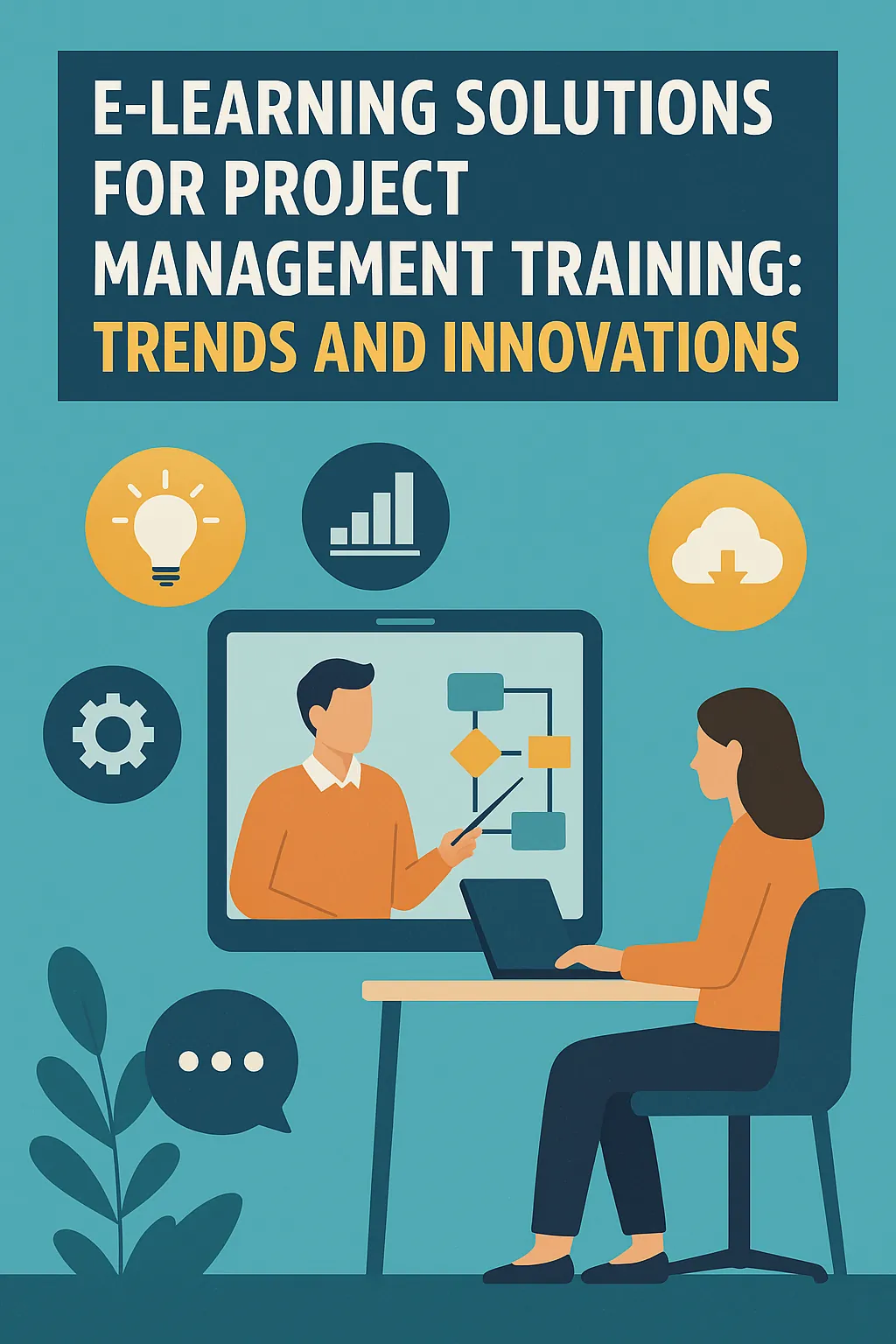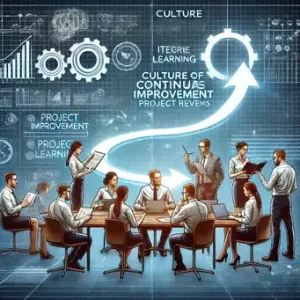Introduction to E-Learning in Project Management
In project management, e-learning has emerged as a pivotal tool for training and development. This section aims to provide a foundational understanding of e-learning, its significance in project management training, and the necessity for educators and trainers to embrace technological advancements.
Definition of E-Learning and Its Relevance to Project Management Training
E-learning, or electronic learning, refers to the use of digital technologies to facilitate education and training. It encompasses a wide range of formats, including online courses, webinars, virtual classrooms, and interactive modules. In the context of project management training, e-learning offers several advantages:
- Flexibility: Learners can access materials at their convenience, allowing them to balance training with their professional responsibilities.
- Scalability: E-learning solutions can accommodate a large number of participants, making it easier to train teams across different locations.
- Cost-Effectiveness: Reducing the need for physical materials and travel expenses, e-learning can significantly lower training costs.
The relevance of e-learning in project management is underscored by its ability to deliver up-to-date content that reflects the latest industry standards and practices, ensuring that project managers are well-equipped to handle contemporary challenges.
Overview of the Growing Demand for E-Learning Solutions in the Project Management Field
The demand for e-learning solutions in project management has surged in recent years, driven by several factors:
- Globalization: As organizations expand their operations internationally, the need for consistent training across diverse teams has increased. E-learning provides a unified platform for delivering training materials to a global audience.
- Remote Work Trends: The rise of remote work has necessitated innovative training solutions that can be accessed from anywhere. E-learning platforms cater to this need by offering online access to training resources.
- Continuous Learning Culture: There is a growing emphasis on lifelong learning within the project management profession. E-learning supports this culture by providing ongoing access to educational resources, enabling professionals to stay current with industry trends and methodologies.
Importance of Adapting to Technological Advancements in Training Methodologies
As technology continues to advance, project management educators and trainers must adapt their methodologies to incorporate these innovations. The integration of e-learning tools not only enhances the learning experience but also aligns training practices with the expectations of modern learners. Key technological advancements influencing e-learning in project management include:
- Interactive Learning Environments: Tools such as simulations and gamification create engaging learning experiences that enhance knowledge retention and application.
- Data Analytics: E-learning platforms often include analytics features that allow trainers to track learner progress and identify areas for improvement, enabling more personalized training approaches.
- Mobile Learning: With the proliferation of smartphones and tablets, mobile learning solutions allow learners to access training materials on-the-go, further increasing flexibility and accessibility.
Current Trends in E-Learning for Project Management
The landscape of project management training is rapidly evolving, driven by advancements in technology and changing learner preferences. As project management educators and trainers seek to enhance their training programs, several key trends in e-learning are emerging. Here are the latest innovations shaping e-learning solutions for project management training:
- Shift Towards Blended Learning Approaches: Many training programs are now incorporating blended learning models that combine traditional face-to-face instruction with online components. This approach allows for greater flexibility and personalization, enabling learners to engage with content at their own pace while still benefiting from direct interaction with instructors and peers. Blended learning not only enhances the learning experience but also caters to diverse learning styles, making it a popular choice among project management educators.
- Increased Use of Gamification to Enhance Engagement: Gamification is becoming a significant trend in e-learning, particularly in project management training. By integrating game-like elements such as points, badges, and leaderboards, trainers can create a more engaging and motivating learning environment. This approach encourages learners to participate actively, fosters healthy competition, and enhances retention of knowledge. Gamified training modules can simulate real-world project scenarios, allowing learners to practice their skills in a risk-free setting.
- Popularity of Microlearning for Just-in-Time Training: Microlearning, which involves delivering content in small, easily digestible segments, is gaining traction in project management training. This method allows learners to access specific information or skills precisely when they need them, making it ideal for just-in-time training. Microlearning modules can be delivered through various formats, including videos, infographics, and quizzes, enabling learners to quickly acquire knowledge without overwhelming them with excessive information. This trend aligns well with the fast-paced nature of project management, where timely access to information is crucial.
- Integration of Mobile Learning Apps for On-the-Go Access: With the increasing reliance on mobile devices, the integration of mobile learning apps is transforming how project management training is delivered. These apps provide learners with the flexibility to access training materials anytime and anywhere, making it easier to fit learning into their busy schedules. Mobile learning solutions often include interactive features such as push notifications, discussion forums, and progress tracking, which enhance the overall learning experience. This trend is particularly beneficial for project managers who are frequently on the move and need quick access to training resources.
Innovative E-Learning Tools and Platforms
E-learning solutions are becoming increasingly vital. Educators and trainers are leveraging innovative tools and platforms to enhance the learning experience, making it more engaging and effective. Here’s an overview of some of the most cutting-edge e-learning tools and platforms that are transforming project management training.
1. Learning Management Systems (LMS)
Learning Management Systems (LMS) are at the forefront of e-learning for project management. These platforms provide a structured environment for delivering training content, tracking learner progress, and assessing performance. Some popular LMS options include:
- Moodle: An open-source platform that offers flexibility and customization, making it suitable for various training needs.
- Canvas: Known for its user-friendly interface, Canvas supports multimedia content and integrates well with other tools.
- TalentLMS: This cloud-based LMS is designed for corporate training, offering features like gamification and mobile access to enhance learner engagement.
These systems not only streamline the training process but also provide valuable analytics to help educators refine their programs.
2. Virtual Reality (VR) and Augmented Reality (AR)
The integration of Virtual Reality (VR) and Augmented Reality (AR) into project management training is revolutionizing how simulations are conducted. These technologies allow learners to immerse themselves in realistic project scenarios, enhancing their problem-solving and decision-making skills. For instance:
- VR Simulations: Trainees can experience project environments and challenges in a controlled setting, allowing for hands-on practice without real-world consequences.
- AR Applications: These can overlay digital information onto the physical world, helping learners visualize project components and workflows in real-time.
By utilizing VR and AR, trainers can create engaging and interactive learning experiences that significantly improve retention and understanding.
3. Collaborative Tools
Collaboration is key in project management, and tools like Slack and Trello are essential for fostering team-based learning. These platforms facilitate communication and project tracking, making them ideal for training environments:
- Slack: This messaging platform allows for real-time communication, file sharing, and integration with other tools, promoting collaboration among learners.
- Trello: A visual project management tool that helps teams organize tasks and workflows, Trello can be used in training to simulate project planning and execution.
By incorporating these collaborative tools, trainers can enhance teamwork skills and prepare learners for real-world project management scenarios.
4. Video Conferencing Tools
With the rise of remote training sessions, video conferencing tools have become indispensable for project management educators. Platforms like Zoom and Microsoft Teams offer several benefits:
- Interactive Learning: Video conferencing allows for live discussions, Q&A sessions, and group activities, making the training more interactive.
- Accessibility: These tools enable trainers to reach a wider audience, breaking geographical barriers and allowing participants to join from anywhere in the world.
- Recordings: Sessions can be recorded for future reference, providing learners with the opportunity to revisit complex topics at their own pace.
Utilizing video conferencing tools not only enhances the learning experience but also ensures that training is accessible and flexible.
Designing Effective E-Learning Programs for Project Management
In project management, e-learning solutions have emerged as a vital tool for educators and trainers. As the demand for skilled project managers grows, it is essential to design effective e-learning programs that not only impart knowledge but also engage learners. Here are some key principles and strategies to consider when developing e-learning programs for project management.
Key Principles of Instructional Design Specific to Project Management
- Learner-Centric Approach: Focus on the needs and preferences of the learners. Understanding their backgrounds, experiences, and learning styles can help tailor the content to be more relevant and impactful.
- Clear Learning Objectives: Establish specific, measurable, achievable, relevant, and time-bound (SMART) objectives that align with the competencies required in the project management field. This clarity helps guide the design process and ensures that learners know what to expect.
- Contextual Learning: Incorporate real-world scenarios and case studies that reflect the complexities of project management. This approach helps learners apply theoretical knowledge to practical situations, enhancing retention and understanding.
Importance of Aligning Training Objectives with Industry Standards and Competencies
Aligning training objectives with recognized industry standards, such as those set by the Project Management Institute (PMI) or other relevant bodies, is crucial. This alignment ensures that the training program:
- Meets Professional Requirements: By adhering to industry standards, educators can ensure that their programs prepare learners for certification exams and professional roles.
- Enhances Credibility: Programs that are aligned with established competencies are more likely to be recognized and valued by employers, increasing the employability of graduates.
- Facilitates Continuous Improvement: Regularly updating training objectives to reflect changes in industry standards helps maintain the relevance and effectiveness of the program.
Strategies for Creating Engaging and Interactive Content
- Utilize Multimedia Elements: Incorporate videos, infographics, and interactive simulations to cater to different learning styles and keep learners engaged. Visual aids can simplify complex concepts and enhance understanding.
- Gamification: Introduce game-like elements such as quizzes, leaderboards, and rewards to motivate learners and encourage participation. Gamification can make learning more enjoyable and foster a competitive spirit.
- Collaborative Learning: Encourage group projects and discussions through online forums or virtual classrooms. Collaborative learning not only enhances engagement but also mirrors the teamwork essential in project management.
- Microlearning: Break down content into smaller, digestible modules that learners can complete at their own pace. This approach allows for flexibility and can improve retention by reducing cognitive overload.
Tips for Assessing Learner Progress and Program Effectiveness
- Regular Assessments: Implement formative assessments throughout the program to gauge learner understanding and provide timely feedback. This can include quizzes, assignments, and peer reviews.
- Surveys and Feedback: Collect feedback from learners regarding the content, delivery, and overall experience. This information is invaluable for making necessary adjustments and improvements.
- Performance Metrics: Establish key performance indicators (KPIs) to measure the effectiveness of the training program. Metrics such as completion rates, learner satisfaction, and post-training performance can provide insights into the program’s success.
- Continuous Improvement: Use the data collected from assessments and feedback to refine and enhance the e-learning program continually. Staying responsive to learner needs and industry changes is essential for maintaining program relevance.
By focusing on these principles and strategies, project management educators and trainers can design effective e-learning programs that not only meet the needs of learners but also prepare them for the challenges of the project management profession. Embracing the latest e-learning tools and innovations will ensure that training remains relevant, engaging, and impactful in an ever-changing landscape.
Future of E-Learning in Project Management Training
E-learning solutions are at the forefront of this transformation, driven by emerging technologies and a growing emphasis on continuous learning. Here are some key trends and innovations shaping the future of e-learning in project management training:
Emerging Technologies and Their Potential Impact on Training
- Artificial Intelligence (AI) and Machine Learning: These technologies are revolutionizing how training programs are designed and delivered. AI can personalize learning experiences by analyzing user data to tailor content to individual needs, thereby enhancing engagement and retention. Machine learning algorithms can predict learner behavior and suggest resources, making training more efficient and effective.
- Virtual and Augmented Reality (VR/AR): These immersive technologies offer unique opportunities for experiential learning in project management. For instance, VR can simulate real-world project scenarios, allowing learners to practice decision-making and problem-solving in a safe environment. This hands-on approach can significantly enhance understanding and application of project management principles.
- Gamification: Incorporating game-like elements into e-learning platforms can increase motivation and engagement. By using points, badges, and leaderboards, trainers can create a competitive yet collaborative learning environment that encourages continuous participation and skill development.
Predictions for the Evolution of E-Learning Platforms and User Experience
- Increased Interactivity: Future e-learning platforms are expected to prioritize interactivity, allowing learners to engage with content through discussions, quizzes, and collaborative projects. This shift will foster a more dynamic learning environment where knowledge is co-created rather than passively consumed.
- Mobile Learning: As mobile technology continues to advance, e-learning platforms will likely become more mobile-friendly, enabling learners to access training materials anytime and anywhere. This flexibility is crucial for project managers who often work in diverse environments and need to learn on the go.
- Integration of Social Learning: Social media and online communities will play a significant role in the future of e-learning. Platforms that facilitate peer-to-peer learning and networking will enhance the educational experience, allowing project management professionals to share insights, challenges, and best practices.
Importance of Continuous Learning and Adaptability in Project Management Education
- Lifelong Learning: The rapid pace of change in project management methodologies and tools necessitates a commitment to lifelong learning. E-learning solutions can support this by providing ongoing access to updated content and resources, ensuring that project managers remain current with industry trends and practices.
- Adaptability: As project management evolves, so too must the skills and knowledge of its practitioners. E-learning platforms that emphasize adaptability will prepare learners to navigate changes in project environments, methodologies, and technologies. This focus on adaptability will be essential for fostering resilience and innovation in project management teams.
Conclusion
The integration of innovative e-learning tools has become essential for effective training and skill development. As we have explored throughout this blog, these solutions not only enhance the learning experience but also cater to the diverse needs of project management professionals. Here are the key takeaways:
- Importance of Innovative E-Learning Tools: The adoption of cutting-edge e-learning platforms and tools is crucial for delivering engaging and interactive training experiences. These technologies facilitate real-time collaboration, provide access to a wealth of resources, and allow for personalized learning paths that can significantly improve knowledge retention and application in real-world scenarios.
- Encouragement for Educators: Project management educators and trainers are encouraged to actively explore and implement new e-learning strategies. By embracing these innovations, educators can enhance their teaching methodologies, making learning more accessible and effective for their students. This shift not only prepares learners for the challenges of modern project management but also positions educators as leaders in the field.
As we move forward, let us embrace the potential of e-learning solutions to transform project management training. Together, we can create a more dynamic and effective learning environment that equips future project managers with the skills they need to succeed.
Find out more about Shaun Stoltz https://www.shaunstoltz.com/about/.
This post was written by an AI and reviewed/edited by a human.



